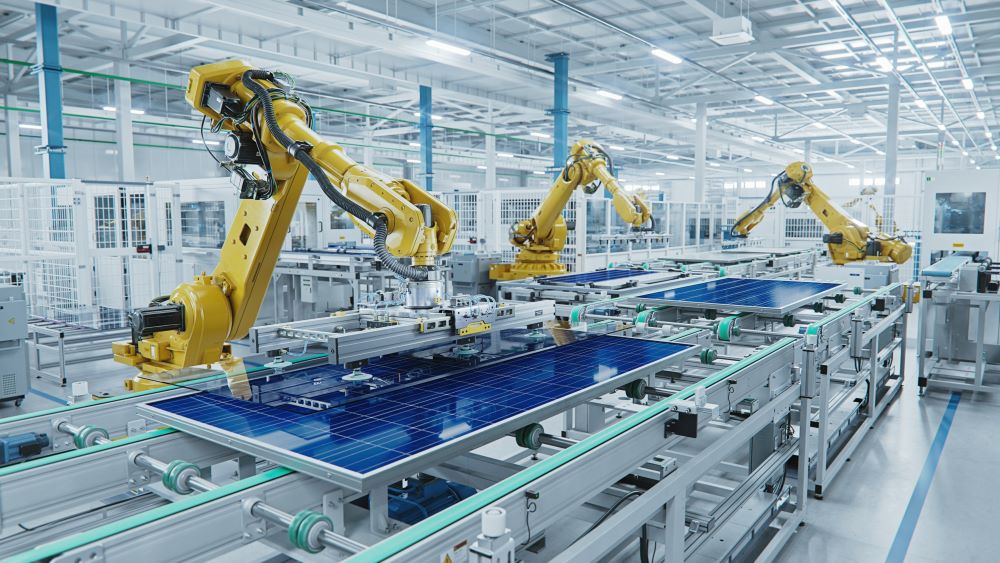Most of us are used to today’s factory floors, with new and cutting-edge technologies integrated seamlessly into everyday processes. Yet, these same floors would be completely unrecognizable to manufacturers in the twentieth century. Consider that the assembly line wasn’t patented until 1901. Or that the first industrial robot wasn’t introduced until 1961. Technology has truly revolutionized the way we do business, and it’s moving at a lightning-fast pace.
But how do you keep up with today’s newest manufacturing trends, like smart factories and cutting-edge advanced manufacturing trends? One way to do so is by attending a cross-sector advanced manufacturing conference like Rally. We’ll talk more about Rally later in this article, but first, let’s explore more about smart manufacturing, including what a smart factory is and why it’s so critical to manufacturing now and in the future.
What Is the Concept of a Smart Factory?
A smart factory is a manufacturing facility that employs internet-connected devices, machines, and systems to continuously collect and share data. That data then goes on to inform decisions about overall processes, problems, maintenance, staffing, and more. Smart factory manufacturing is just one part of Industry 4.0, the current and fourth industrial revolution that’s being driven by digitization, data, and connectivity.
Gartner defines smart factories by their ability to “create new forms of efficiency and flexibility by connecting different processes, information streams and stakeholders (frontline workers, planners, etc.) in a streamlined fashion.” In essence, smart factories are a way for the industry to embrace modern advanced manufacturing tools and technologies that exist while also improving processes and the overall shop floor experience.
But what exactly do these types of factories look like? According to Deloitte, the defining characteristics of a smart factory include:
- Connection: First and foremost, smart factories and their components, including devices, machines, processes, and systems, are all connected so that real-time data can be automatically collected.
- Proactiveness: Thanks to technologies like the Internet of Things (IoT), smart factories have data that illustrates where problems or inefficiencies are located. Smart factories use this information to make proactive decisions about restocking, maintenance, quality control, and more.
- Transparency: Smart factories are transparent with the massive amount of data they collect. From real-time data visualizations to transparency in customer demand, smart factories consistently view and use their data to iterate and improve.
- Optimization: Smart factories are designed to optimize capacity, materials, staffing, and costs. This leads to their ability to manufacture products quicker and more efficiently than their traditional counterparts.
- Agility: In today’s ever-changing world, manufacturing facilities must be flexible. Smart factories are agile, in that they’re able to quickly adapt, scale, pivot, and implement changes based on schedules or product load.
Why Is the Smart Factory Important?
At a high level, smart factories are important because they represent the next generation of efficiency. When everything, including machines, devices, and systems, are in alignment, factory floors are more streamlined, cost-effective, and nimble. When you get down into the details of smart factory benefits, there are several that stand out.
- Streamlined Processes: Just about every industry these days is looking to cut costs. With inflation impacting the costs of raw materials, gas prices, and labor, lean business practices are more important than ever. One of the many benefits of a smart factory is that the data available can and should be used to recognize patterns, reduce material waste, and optimize labor usage.
- Increased Predictability: In manufacturing, there’s no room for surprises. Smart factory solutions—like smart sensors, artificial intelligence, and remote monitoring—enable decision makers to better practice proactive maintenance. This increased predictability ultimately saves money and keeps equipment up and running as expected.
- Operational Flexibility: As we described above, agile operations is one of the hallmarks of smart factory and smart manufacturing processes. But why does this matter? Customer demands change on a whim. An increasing number of consumers now seek hyper-personalized goods. And supply chain fluctuations still persist. Operational flexibility, from the way goods are manufactured to the layout of a factory floor, helps businesses meet these challenges.
- Improved Productivity: One of the biggest advantages of the smart factory is that it enables better productivity. The tools and technologies that power smart factories empower decision makers to monitor changes in the supply chain and potential downtime or delays to act accordingly. What’s more, when integrated with advanced manufacturing solutions like automation and robotics, it can even decrease the need for employees to perform time-consuming, manual, and repetitive tasks.
Want More on Smart Manufacturing? Look No Further Than Rally!
While the above information is a great primer into why smart manufacturing is such an important process, it really just scratches the surface. It’s not a stretch to say that smart manufacturing and Industry 4.0 are revolutionizing the way we produce goods. And the best way to stay in the know about these topics is by attending a cross-sector conference like Rally.
Rally brings together entrepreneurs, C-Suite executives, policymakers, investors, thought leaders, and other passionate professionals to network, collaborate, and learn from one another. Oh, and did we mention our pitch competition with up to $1M in investment?
This year’s event is going to be one for the books, and we can’t wait to see you there. Sign up today to secure your spot!
